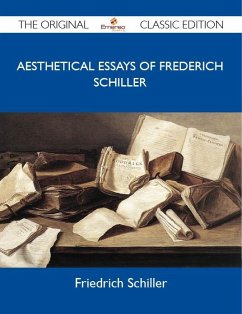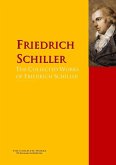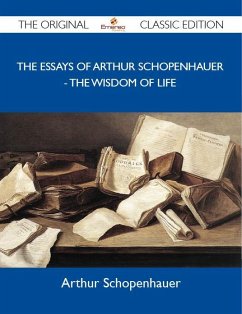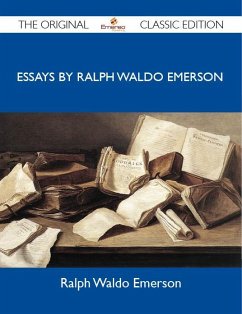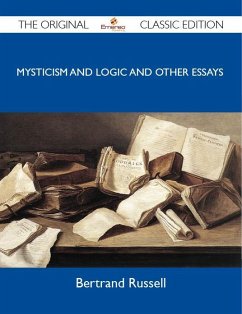Johann Christoph Friedrich von Schiller (10 November 1759 - 9 May 1805) was a German poet, philosopher, historian, and playwright. During the last seventeen years of his life (1788-1805), Schiller struck up a productive, if complicated, friendship with already famous and influential Johann Wolfgang von Goethe.
They frequently discussed issues concerning aesthetics, and Schiller encouraged Goethe to finish works he left as sketches. This relationship and these discussions led to a period now referred to as Weimar Classicism.
They also worked together on Xenien, a collection of short satirical poems in which both Schiller and Goethe challenge opponents to their philosophical vision.
This is a high quality book of the original classic edition.
This is a freshly published edition of this culturally important work, which is now, at last, again available to you.
Enjoy this classic work. These few paragraphs distill the contents and give you a quick look inside:
One of the best German writers on the history of German literature remarks: If the aim and nature of all poetry is to let yourself be filled by a subject and to become penetrated with it; if the simple representation of unartificial, true, and glowing feelings belongs to its most beautiful adornments; if the faithful direction of the heart to the invisible and eternal is the ground on which at all times the most lovely flowers of poetry have sprouted forth, these legendary poems of early Germany, in their lovely heartiness, in their unambitious limitation, and their pious sense, deserve a friendly acknowledgment. ... If we make a present reality of the heroic songs of the early German popular poetry, and the chivalrous epics of the art poetry, the military expeditions and dress of the Crusades, this legendary poetry appears as the invention of humble pilgrims, who wander slowly on the weary way to Jerusalem, with scollop and pilgrims staff, engaged in quiet prayer, till they are all to kneel at the Saviours sepulchre; and thus contented, after touching the holy earth with their lips, they return, poor as they were, but full of holy comfort, to their distant home.
While the knightly poetry is the poetry of the splendid secular life, full of cheerful joy, full of harp-tones and song, full of tournaments and joyous festivals, the poetry of the earthly love for the earthly bride, the poetry of the legends is that of the spontaneous life of poverty, the poetry of the solitary cloister cell, of the quiet, well-walled convent garden, the poetry of heavenly brides, who without lamenting the joys of the world, which they need not, have their joy in their Saviour in tranquil piety and devout resignation-who attend at the espousals of Anna and Joachim, sing the Magnificat with the Holy Mother of God, stand weeping beneath the cross, to be pierced also by the sword, who hear the angel harp with St.
...If we, by a certain effort, manage to place ourselves back on the standpoint of childlike poetic faith of that time, and set aside in thought the materializing and exaggeration of the hagiology and Mariolatry produced by later centuries, rendering the reaction of the Reformation unavoidable-if now in our age, turned exclusively to logical ideas and a negative dialectic, we live again by thought in those ages of feeling and poetry-if we acknowledge all these things to be something more than harmless play of words and fancy, and as the true lifelike contents of the period, then we can properly appreciate this legendary poetry as a necessary link in the crown of pearls of our ancient poetry.
They frequently discussed issues concerning aesthetics, and Schiller encouraged Goethe to finish works he left as sketches. This relationship and these discussions led to a period now referred to as Weimar Classicism.
They also worked together on Xenien, a collection of short satirical poems in which both Schiller and Goethe challenge opponents to their philosophical vision.
This is a high quality book of the original classic edition.
This is a freshly published edition of this culturally important work, which is now, at last, again available to you.
Enjoy this classic work. These few paragraphs distill the contents and give you a quick look inside:
One of the best German writers on the history of German literature remarks: If the aim and nature of all poetry is to let yourself be filled by a subject and to become penetrated with it; if the simple representation of unartificial, true, and glowing feelings belongs to its most beautiful adornments; if the faithful direction of the heart to the invisible and eternal is the ground on which at all times the most lovely flowers of poetry have sprouted forth, these legendary poems of early Germany, in their lovely heartiness, in their unambitious limitation, and their pious sense, deserve a friendly acknowledgment. ... If we make a present reality of the heroic songs of the early German popular poetry, and the chivalrous epics of the art poetry, the military expeditions and dress of the Crusades, this legendary poetry appears as the invention of humble pilgrims, who wander slowly on the weary way to Jerusalem, with scollop and pilgrims staff, engaged in quiet prayer, till they are all to kneel at the Saviours sepulchre; and thus contented, after touching the holy earth with their lips, they return, poor as they were, but full of holy comfort, to their distant home.
While the knightly poetry is the poetry of the splendid secular life, full of cheerful joy, full of harp-tones and song, full of tournaments and joyous festivals, the poetry of the earthly love for the earthly bride, the poetry of the legends is that of the spontaneous life of poverty, the poetry of the solitary cloister cell, of the quiet, well-walled convent garden, the poetry of heavenly brides, who without lamenting the joys of the world, which they need not, have their joy in their Saviour in tranquil piety and devout resignation-who attend at the espousals of Anna and Joachim, sing the Magnificat with the Holy Mother of God, stand weeping beneath the cross, to be pierced also by the sword, who hear the angel harp with St.
...If we, by a certain effort, manage to place ourselves back on the standpoint of childlike poetic faith of that time, and set aside in thought the materializing and exaggeration of the hagiology and Mariolatry produced by later centuries, rendering the reaction of the Reformation unavoidable-if now in our age, turned exclusively to logical ideas and a negative dialectic, we live again by thought in those ages of feeling and poetry-if we acknowledge all these things to be something more than harmless play of words and fancy, and as the true lifelike contents of the period, then we can properly appreciate this legendary poetry as a necessary link in the crown of pearls of our ancient poetry.
Dieser Download kann aus rechtlichen Gründen nur mit Rechnungsadresse in A, D ausgeliefert werden.

